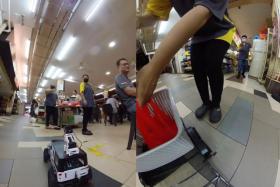SCDF turns to AI to help emergency dispatch phone operators
Speech recognition system can transcribe and log emergency calls in real time
With Singapore's emergency dispatch phone operators receiving almost 200,000 calls for assistance a year, every minute is vital.
In an effort to ease their workload, the Singapore Civil Defence Force (SCDF) and four other government agencies are turning to artificial intelligence (AI), using a speech recognition system developed to transcribe and log each call received in real time - even if it is in Singlish.
For now the system is programmed to recognise English and Mandarin with some Hokkien and Malay, though it could be customised to incorporate others.
AI Singapore (AISG), a programme under the National Research Foundation, is investing $1.25 million to set up the AI Speech Lab, which is headed by the two professors who created the system.
The lab will adopt the first code-switch, or mixed-lingual, speech recognition engine, developed using artificial intelligence, such as deep learning technology.
"This will improve how SCDF's emergency medical resources are dispatched and enhance the overall health outcomes of those in need," said the SCDF's director of operations, Assistant Commissioner Daniel Seet.
It would do so by reducing the time it takes the SCDF's 995 operations centre dispatchers to log in information.
The AI Speech Lab is led by Professor Li Haizhou, an expert in speech, text and natural language processing from the National University of Singapore, and Associate Professor Chng Eng Siong from the Nanyang Technological University.
He said: "This technology performs better than commercial engines as it can accurately recognise conversations comprising words from different languages. It solves a unique Singapore problem."
Researchers collected over 1,000 hours of combined recordings of English and Mandarin speech from Singapore and Penang - a state that mixes languages in speech similar to that in Singapore - and recordings of Singaporeans from radio stations, YouTube and SoundCloud.
The recordings are manually transcribed to text. The system then "learns" the association between the text and the collected samples. It knows about 40,000 English and Mandarin words each, and has an accuracy rate of about 90 per cent.
Details of when, where and how the system will be trialled have yet to be announced.
Get The New Paper on your phone with the free TNP app. Download from the Apple App Store or Google Play Store now


